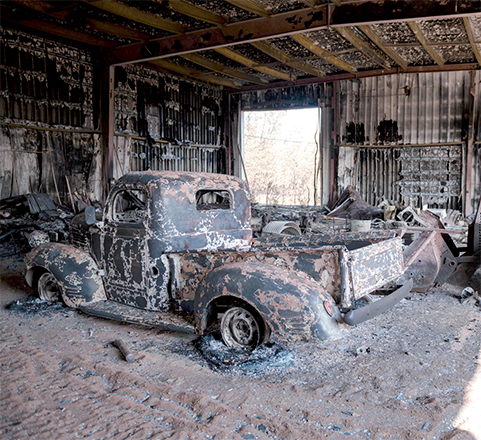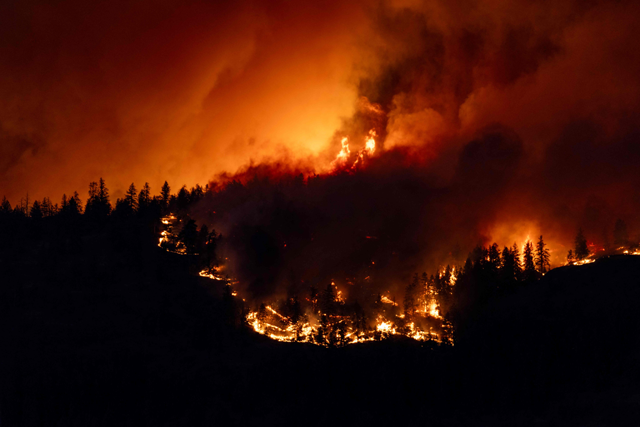You are here
Milder weather brings relief from 'apocalyptic' Canada wildfires
By AFP - Aug 22,2023 - Last updated at Aug 22,2023

Charred remains are seen on the side of the road beside the highway in Enterprise, Northwest Territories, Canada, on Sunday (AFP photo)
WEST KELOWNA, Canada — Cooling weather on Monday gave firefighters a slight edge against what the prime minister described as "apocalyptic" wildfires blazing across western Canada, after tens of thousands were evacuated or put on alert.
Two fires threatening large parts of the scenic Okanagan Valley, including the cities of Kelowna and neighbouring West Kelowna in British Columbia, merged over the weekend.
Around 30,000 people in the province where 385 fires are now burning, out of almost 1,040 nationwide, had been under evacuation orders while another 36,000 were under alert to be ready to flee.
British Columbia's emergency management minister, Bowinn Ma, warned that the situation was "highly dynamic".
West Kelowna Fire Chief Jason Brolund, however, sounded a note of optimism, telling a news conference late Sunday: "We're finally feeling like we're moving forward, rather than we're moving backwards."
Temperatures in the major wine-producing region around Kelowna were expected to stay cool through Monday, creeping into the low 20ºC in the afternoon.
There was also some rain forecast starting Tuesday.
Officials said it was too soon to start planning a staged return of evacuees as thick smoke continued to choke the area.
Prime Minister Justin Trudeau at a Cabinet retreat in Charlottetown, Prince Edward Island, to discuss the national fire crisis said Canadians "are watching in horror the images of apocalyptic devastation."
"It's a scary and heartbreaking time," he said as "people flee for their lives and worry about their communities".
This summer in Canada, more than 14 million hectares has already burned, roughly the size of Greece and almost twice the area of the last record of 7.3 million hectares. Four people have died so far.
Scientists say human-caused global warming is exacerbating natural hazards, making them both more frequent and more deadly.
‘Horrible to breathe’
Kelowna, a city of 150,000, has become the latest population center hit.
“It has been horrible to spend the week with this air. It is horrible to breathe,” Mary Hicks, a 29-year-old IT worker who had been visiting the region from Montreal, told AFP on Sunday. “I really want to go home.”
But she was stuck for now, with her return flight cancelled. The airport hopes to resume flights this week, depending on visibility.
“When I had to pack, in the moment I was crying, crying, crying,” said April, 39, who with her two small children fled her home east of Kelowna and was staying in a hotel outside the city.
On the other side of Okanagan Lake, a number of homes on the outskirts of West Kelowna had been burned.
“My sister’s boyfriend’s house has burnt down. He lives in the West Kelowna side and it was so windy that the fire was spreading and they couldn’t control it,” said Bogi Bagosi, a 16-year-old student.
“It’s kind of heartbreaking to watch the city burn down. They are doing their best to stop it but it is not enough.”
The confusion and terror of the fires and evacuations have been compounded by Meta’s blocking of Canadian news on Facebook and Instagram, in response to a new law requiring digital giants to pay publishers for articles.
“It is inconceivable that a company like Facebook is choosing to put corporate profits ahead of [safety]... and keeping Canadians informed about things like wildfires,” Trudeau said on Monday.
Cooler with rain ‘a bit of help’
In Canada’s far north, crews held back a massive fire threatening Yellowknife, the capital of the Northwest Territories. They were helped by some rain over the weekend.
Yellowknife, now a ghost town, except for emergency personnel who stayed behind to build fire barriers and lay out sprinklers, and many small communities in the near-Arctic region have been evacuated, leaving two thirds of the population of the Northwest Territories displaced.
“With a little bit of help from the weather over the past few days and a lot of good firefighting work we’ve been able to keep this thing at bay for the time being,” local fire information officer Mike Westwick told a briefing.
Related Articles
KELOWNA, Canada — Officials in western Canada's British Columbia implored tens of thousands of residents to heed evacuation orders on Saturd
KELOWNA, Canada — Wildfires bore down on two Canadian cities Friday, with firefighters in the west bracing for another "scary" night as stun
OTTAWA — Another town in Canada's Northwest Territories was forced to evacuate on Saturday as strong winds and rising temperatures gave new

















